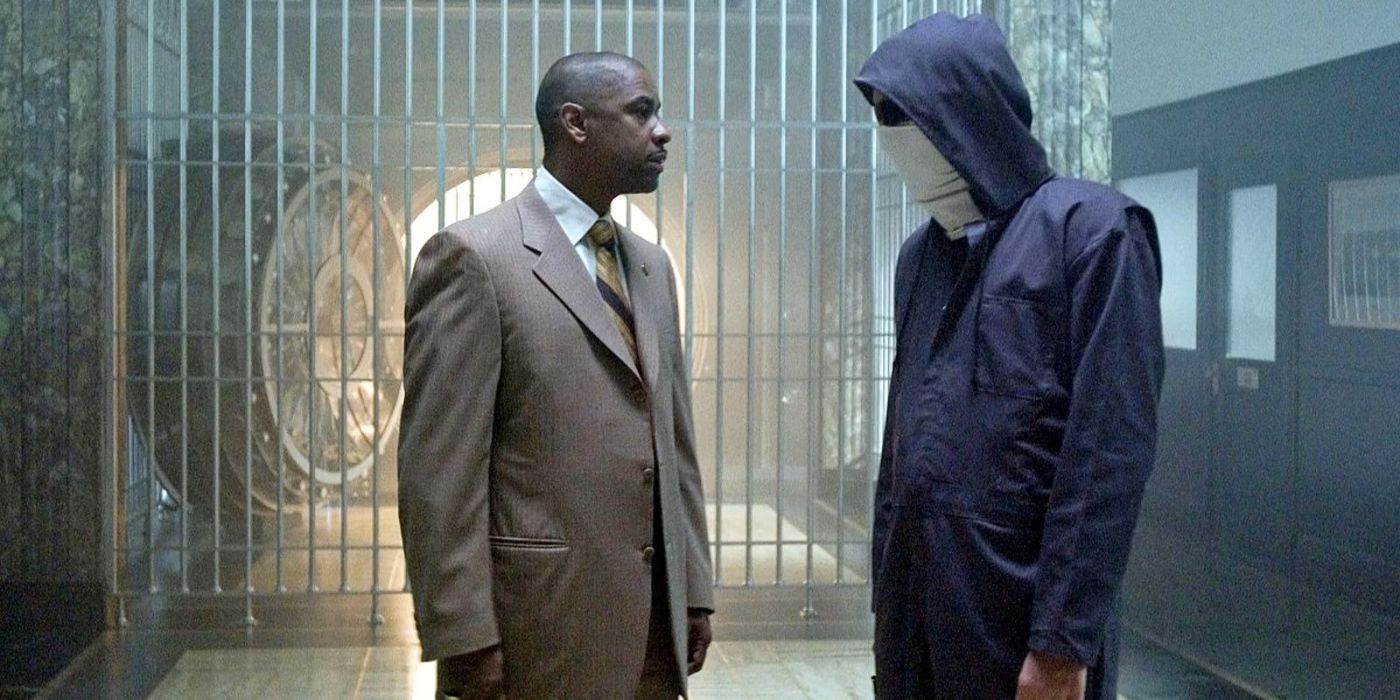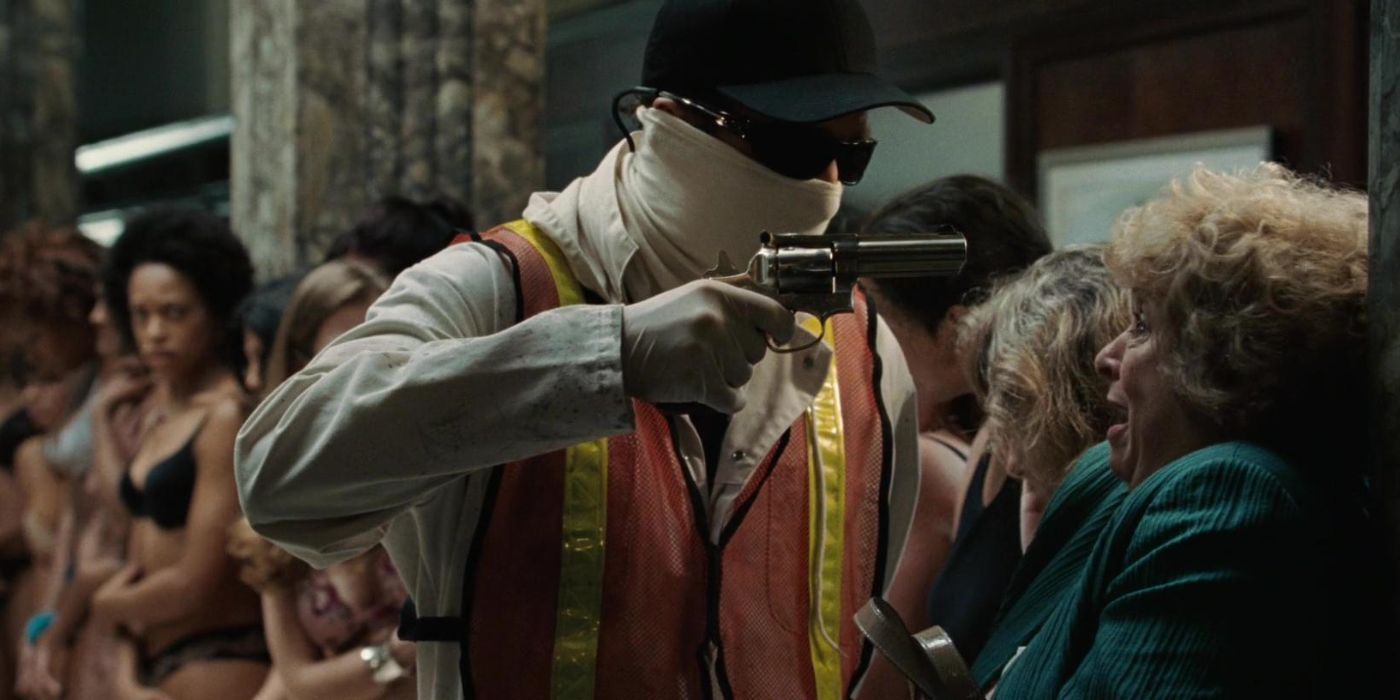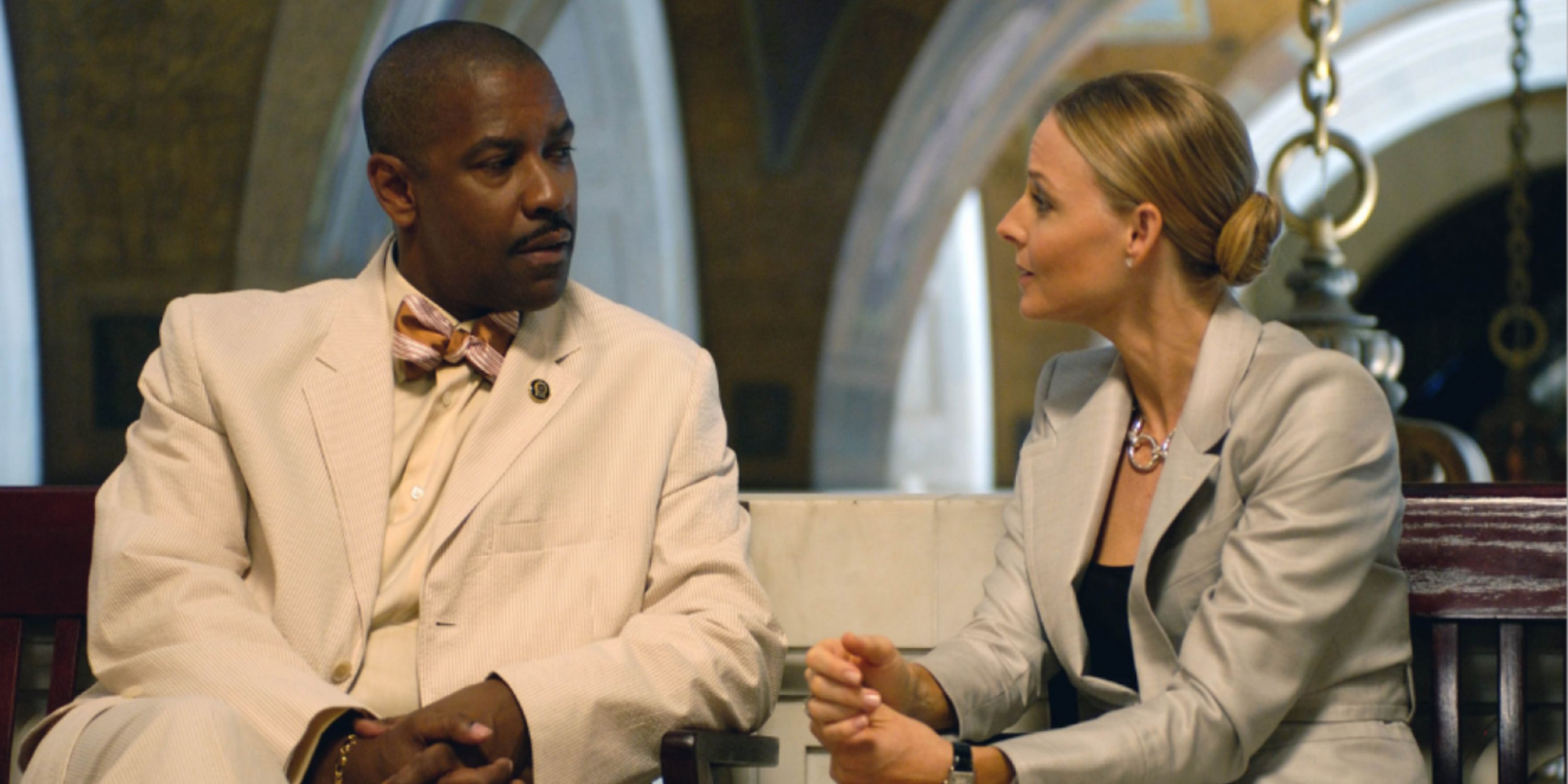The Big Picture
- Dalton Russell’s heist in “Inside Man” challenges the idea of a victimless crime, exposing the consequences of his actions.
- The film’s twist ending reveals a complex web of characters with hidden motivations, leading to a captivating narrative.
- Spike Lee’s
Inside Man
stands out in the heist genre with its stylized storytelling, talented cast, and exploration of morality.
In the opening monologue of Spike Lee’s Inside Man, Dalton Russell (Clive Owen) sits in a tiny cell of his own making, boasting about pulling off the perfect bank robbery. He hasn’t actually left the bank yet — the cell is built into a wall in the bank’s storage room — but he knows he will. Alone in the gloomy crawl space, he’s recording what amounts to a title card for the audience. Russell divulges the who, what, where, when, and why of the robbery. He insists that everything is right on track. Every great heist movie has a guy like Dalton. He knows more than you do, which is how the audience wants it. Being brought along for every twist and turn is the best part of the genre. But does he pull off a victimless crime in Inside Man? Is there really such a thing? Because the only time people talk about crimes without victims, stealing from the morally compromised wealthy class and redistributing their wealth among poor people is always front-and-center.
Later in the film, even as hordes of heavily armed NYPD officers surround the bank he’s robbing, Russell tells anyone who asks how he’s going to escape from the bank. When Detective Keith Frazier (Denzel Washington) — for whom he’s gained begrudging respect — asks him, “Why don’t you just walk out that [front] door?” he responds, “I will. I’m going to walk out that door when I’m good and ready.” He is brimming with bravado and hubris because he’s thought of absolutely everything, so it’s not surprising when he does ultimately stroll out of the bank, a duffle bag full of blood diamonds slung casually over his shoulder. What is surprising is how few of the questions Russell actually answered in his opening monologue. By the time he escapes, the who, what, where, when, and why of the heist have all been busted wide open, leaving in their wake a slew of further questions for Detective Frazier and viewers alike.
Inside Man (2006)
A police detective, a bank robber, and a high-power broker enter high-stakes negotiations after the criminal’s brilliant heist spirals into a hostage situation.
- Actors
- Denzel Washington, Clive Owen, Jodie Foster, Willem Dafore, Christopher Plummer, Chiwetel Ejiofor
- Release Date
- March 24, 2006
- Director
- Spike Lee
- Run Time
- 129 mins
The twist ending is highly stylized and one of several elements that makes Inside Man stand apart in the bank heist genre. There is what is widely regarded by moviegoers and critics alike as having a “Robin Hood” nobility on the part of Dalton Russell. Calling his actions “victimless” is a slippery slope and not easily defined. By putting the lives of so many people in danger – even if it is for a good reason – there is an arrogance in Russell that may make for a compelling character, but it doesn’t change the fact that he endangered dozens of innocent civilians. Not to mention the trauma that he exposes them to. The individual interviews with the hostages that Frazier and Mitchell conduct after the heist give the viewers a greater insight into their state of mind. It wasn’t necessary to do what he did, even if it makes for a terrific cinematic experience with standout performances by both Washington and Owen. The sometimes overlooked but always solid Chiwetel Ejiofor’s performance as Frazier’s partner, Detective Bill Mitchell shouldn’t be overlooked either. Foster and Plummer are solid per usual.
The Who: The Players in ‘Inside Man’s Game
Detective Keith Frazier needs this job to go well. After failing to make detective first grade following (false) accusations that he stole thousands from a previous crime scene, he’s counting on this opportunity to prove to precinct brass that he deserves a promotion. With his superior out of the office, Frazier is called up to negotiate Russell’s arrest and the safe release of hostages. Arthur Case (Christopher Plummer), the ultra-wealthy bank owner is deeply concerned by the break-in to his flagship location. It’s the first bank he ever opened, and he keeps his deepest vulnerabilities locked within its depths. Madeline White (Jodie Foster) is a high-powered fixer for New York’s elite who brokers in backroom handshakes and blackmail. White receives a call from Case about an especially sensitive (and lucrative) opportunity. Working around Frazier, her task is to ensure that the contents of safe deposit box 392 remain in the shadows.
The only major players whose motivations are clear are Frazier and his partner Bill Mitchell. They want to ensure that the hostages in the bank are unharmed and catch the wily Dalton. Meanwhile, Russell, Case, and White are all shady characters with motivations that are strategically hidden from the viewer as Lee deftly amplifies the tension and nuanced drama by slowly peeling away the layers of mystery and masterfully crafted intrigue throughout the film. Inside Man has one of the most talented casts he has assembled and is one of the best heist movies ever made.
The What: A Victimless Heist?
When they finally enter the bank post-robbery, Frazier and crew (including Ejiofor and Willem Dafoe) are shocked to find no suspects (they left with the hostages), no victims (despite a staged hostage murder), no weapons (they were toys), and not a single item stolen from the bank. The vault is open, but all the loot remains in place. The police leave with nothing to go on, begging the question of what the robbers were doing there in the first place?
Shortly thereafter, Frazier finds his first clue — security deposit box 392. Bizarrely, the box isn’t accounted for in the bank’s ledgers dating back to its establishment in the 1940s. Frazier figures that whatever the robbers broke in for, it probably has to do with that box, and that the box must belong to someone who’s been at the bank since its inception, leading him straight to Case. Frazier and Mitchell return to the bank to search for the box, in which they find some Juicy Fruit (an inside joke with Russell), an enormous diamond ring, and an accompanying note from Russell with a simple instruction: “Follow the ring.”
The Where and When: Open and Shut Case
The where and when are less about the robbery itself than the origin of Case’s diamonds. Having traded favors with the mayor and, she thinks, with Frazier (more on this in a moment), Madeline White is granted the special privilege of walking into the bank to negotiate with Russell. She offers Russell a reduced sentence and millions in hush money to ensure the contents of the box stay secret, an offer he turns down easily. Russell’s knowledge is power — he already possesses a paper trail of Case’s dealings with Nazis. As Case later admits to White, it’s how he got rich. “It was sixty years ago,” he said. “I was young and ambitious. I saw a short path to success, and I took it. I sold my soul, and I’ve been trying to buy it back ever since.” The ring belonged to Case’s old friend — a Jew who was taken to a concentration camp — someone he could have helped but didn’t because “the Nazis paid too well.”
The question surrounding Case and what he did is whether he should still be considered the “bad guy” because of a massive error in judgment made over a half-century ago. He is remorseful over having sold out his Jewish friend, and his contrition seems genuine, He has spent his life doing good trying to make up for his misdeeds, but are some poor decisions too egregious to deserve forgiveness? Working with the Nazis and profiteering on the horrendous crimes against humanity perpetrated by the Third Reich is one of those things that Case will take to his grave, and he would have died with his secret if it weren’t for Dalton Russell and his elaborate plan to expose one of the wealthiest and respected bankers in the world. Lee lets the viewer decide whether Case is beyond absolution in another wonderful choice by Russell Gerwitz, who wrote the screenplay.
White gains half-hearted assurances from Russell that he won’t leak what he knows about Case. In exchange, he demands (and she accepts) that if he is to someday stand trial for robbing the bank, Case’s financial might would stand behind him. Unfortunately for White and Case, she overestimated her influence. Twice, actually. White assumes she has Frazier in her pocket by promising to expunge his record of the accusations preventing his promotion. While the leverage gains her access to Russell, it can’t stop Frazier — who’s shrewd enough to record White’s corruption as a contingency — from researching the deposit box. This leads to White’s second miscalculation. No longer needing anything from Case or White after completing the robbery, Russell leaves the ring in the box for Frazier to find before he saunters out the bank’s front door.
The Why: Conscience and Cover-ups
For Case and White, the incentives for covering up the Nazi ties are clear. Case spent decades trying to cleanse his conscience, all while becoming one of the most respected and affluent bankers in Manhattan. Even before the advent of “cancel culture,” Case would likely have been ostracized for his fascist leanings. Meanwhile, White is worried about her own reputation. As New York’s premier fixer, a loss of this magnitude stands to tarnish her status as the go-to problem-solver for troubled aristocrats. Aside from the greed inherent in burglarizing diamonds, Russell’s motives are more righteous. Just after walking out of the bank, Russell’s teammate asks him why he left the ring behind, indicating that the initial plan wasn’t necessarily to unveil Case’s dirty laundry. The money, he says in his final voiceover, “[isn’t] worth much if you can’t face yourself in the mirror.”
The Final Scene: Denzel Washington Always Wins
With his Detective First-Grade certificate in hand, Frazier returns home to his modest apartment, where he finds his girlfriend’s brother drunk and passed out on his couch. He and his girlfriend (Cassandra Freeman) want to move to a bigger place and get engaged, but he’d been waiting for the promotion before making a move. As he reaches into his pockets to unload his belongings, he pulls out a diamond — perfectly sized for a gaudy engagement ring — that Russell slipped into his coat on his way out of the bank, capping off a Robin Hood-esque heist that, as Russell brags, was simply perfect.
Just because it was perfectly executed and no one died doesn’t mean that it was victimless. In the end, it depends on which way you experienced the crime. From Frazier’s point of view, Dalton’s heist was not only victimless, but he came out of it with his reputation restored, a promotion, and a new fiancé. For the customers who were accosted, beaten, forced to strip down, and held hostage with guns stuck in their faces, they would argue that they are the victims of psychological trauma that may cause PTSD moving forward. Case and White, while not necessarily victims, obviously get the short end of the stick due to Dalton’s elaborate scheme. White specializes in burying sensitive, compromising information, and when she fails to protect Case’s doozy of a secret, they both lose, but are hardly prototypical victims. Spike Lee delivers plenty of victims, it’s just not as clear-cut who they are.
Inside Man is currently available to stream on Netflix in the U.S.
WATCH ON NETFLIX







